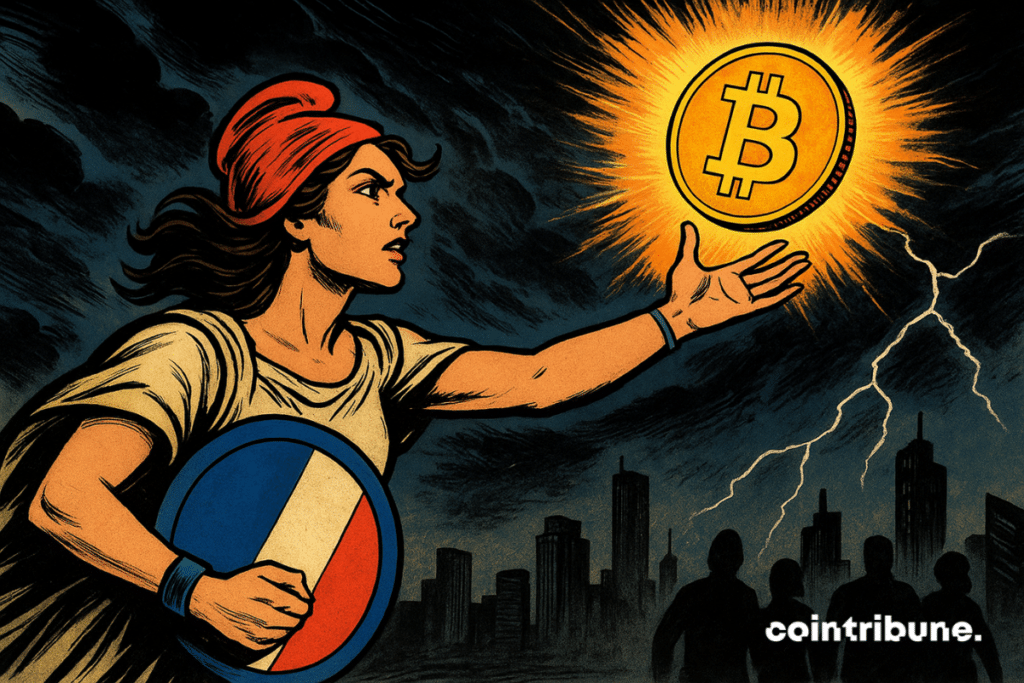Bitcoin: France Catches Up at Last
A tidal wave of bitcoins is pouring into company treasuries. Things finally seem to be clearing up in France.

In brief
- Two French companies are adopting the Bitcoin strategy and have risen into the Top 100.
- “Bitcoin Treasury Companies” provide an alternative for financial institutions that are not allowed to invest directly in bitcoin.
- Companies are on track to double their bitcoin investments ($67 billion) compared to 2024.
Two representatives in the top 100
We recently reported on the ongoing rush of institutional investors on bitcoin. Two French companies are now part of the Top 100.
Sequans arrives in twenty-fourth place with 3,205 BTC ($306 million) in treasury. Capital B ranks twenty-eighth with 2,201 BTC ($193 million).
This is small compared to American companies which represent 36% of the Top 100 with hundreds of thousands of BTC in reserve. Nevertheless, Capital B is helping to drive this shift. Its CEO Alexandre Laizet started working to popularize the Bitcoin strategy in France:
We have observed a real rush since last year. Japan, Canada, England, China, Sweden, Norway, United Arab Emirates, Singapore, Spain, Germany. Companies from about twenty countries have taken the step.
According to a report published by River, they have already invested $43.5 billion in BTC in 2025, compared to $31 billion for the entire year 2024. At this rate, we should reach $67 billion this year, an increase of over 100% compared to last year!
In total, companies collectively hold more than 6% of the total BTC supply, or 1.3 million BTC. That’s 21 times more than five years ago.
Michael Saylor was the pioneer in this area, starting in 2020, buying $250 million worth of BTC for his treasury. His company MicroStrategy (rebranded as Strategy) now owns more than 638,000 BTC (~$60 billion).
What strategy?
The majority of the 3,000 companies surveyed by River consider bitcoin as a long-term investment. Their strategy is to accumulate it regularly, with no intention of selling short to medium term. They allocate on average 22% of their net income to BTC. One third place the majority of their treasury in it.
Those called “Bitcoin Treasury Companies” go even further. They represent 1/4 of companies but make 3/4 of BTC purchases. Capital B and Sequans are in this category. They are the second largest group of bitcoin buyers (1,400 BTC per day), neck and neck with ETFs.
The main objective of Bitcoin Treasury Companies is to offer certain investors the possibility to buy BTC indirectly, via purchasing their shares or bonds.
They offer a convenient way to get exposure to the price where Bitcoin ETFs are not available. The reason can also be fiscal. In Japan, capital gains tax on direct bitcoin sales is higher than on sales of shares.
Above all, some investors are not allowed to buy bitcoins directly.
Bitcoin for all financial institutions
Institutional constraints make holding bitcoins directly difficult for many large investors, regardless of whether they view BTC favorably. The constraints relate to their investment mandates which limit them to specific asset classes.
For example, some funds are limited to bonds. It is then impossible to buy bitcoins directly. However, these funds can invest in bonds issued by a Bitcoin Treasury Company, thus taking a bullish position on bitcoin.
Pension funds, which generally take very little risk, can nevertheless invest in bonds or preferred shares. This approach allows them to benefit from bitcoin’s upside potential while reducing volatility and strictly adhering to their investment guidelines.
For example, Strategy issues preferred shares that offer fixed dividends without voting rights. They are designed to provide bitcoin exposure via its treasury of more than 638,000 BTC. There is something for everyone. Its different financial products are called STRF, STRC, STRK, STRD, etc.
Strategy has raised more than $11.5 billion via common shares since the beginning of the year, and $7.8 billion via the more exotic financial products we just mentioned. That money is immediately used to accumulate more bitcoins.
Bitcoin, the investment thesis
For River, bitcoin’s unique combination of scarcity and liquidity makes it a reliable means to preserve profits. Especially since traditional treasury assets (government bonds, etc.) no longer manage to preserve their value against inflation.
Since 2020, major companies such as Microsoft, Google, and Apple have lost tens of billions in purchasing power by holding these traditional instruments. Had they allocated even 1% of their treasuries to bitcoin in 2020, those losses would have been fully offset.
River
Traditional approaches (share buybacks, acquisitions, strategic investments, etc.) work well during periods of strong economic growth. Except times are changing… Physical limits to growth (energy), tariffs, cold war… Growth keeps weakening decade after decade.
Facing this reality, the most effective way to strengthen financial resilience is to hold stores of value. Bitcoin increasingly appears as a preferred means to preserve profits. River expects bitcoin to establish itself as a global reserve currency.
“Every individual will have bitcoin savings, and every business will have bitcoin on its balance sheet”, reads the report.
The report’s conclusion seems hard to dispute. Knowing that only four companies in the S&P 500 have embraced bitcoin. Not to mention that the United States seems about to make BTC their reserve currency. Still early…
Our article on the subject: The United States is all-in on Bitcoin.
Maximize your Cointribune experience with our "Read to Earn" program! For every article you read, earn points and access exclusive rewards. Sign up now and start earning benefits.
Bitcoin, geopolitical, economic and energy journalist.
The views, thoughts, and opinions expressed in this article belong solely to the author, and should not be taken as investment advice. Do your own research before taking any investment decisions.